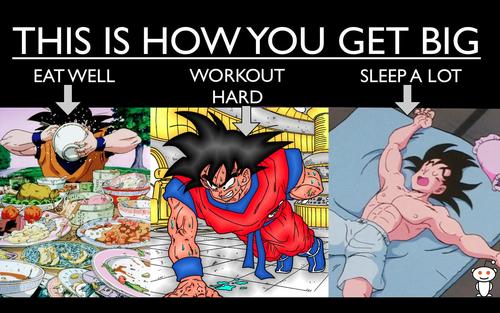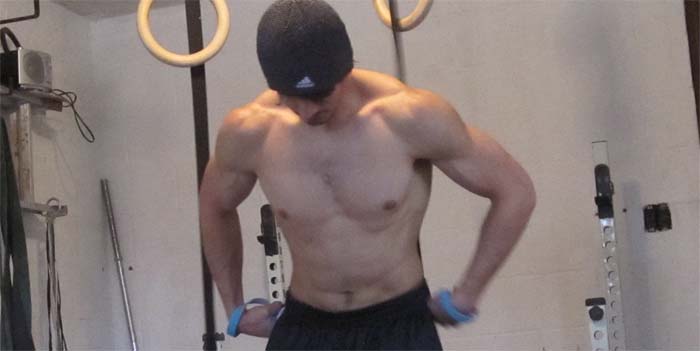What kind of carbohydrates are you eating? Does it make a difference? Isn’t a calorie just a calorie in the end? While I can’t give you a concrete answer to any of these questions, I can ensure you that I wasn’t passing gas in the making of this article. Does that count for anything? Maybe. And [...]
What kind of carbohydrates are you eating? Does it make a difference? Isn’t a calorie just a calorie in the end?
While I can’t give you a concrete answer to any of these questions, I can ensure you that I wasn’t passing gas in the making of this article.
Does that count for anything?
Maybe. And maybe more than you think.
As the legendary Ron Burgundy would put it: Ladies and gentlemen, can I please have your attention. I’ve just been handed an urgent and horrifying news story. I need all of you to stop what you’re doing and listen.
I haven’t really eaten oatmeal in the past few months.
Yes. Me. The same guy that wrote about how to make an oatmeal volcano. The same guy that wrote about including it in The Diet to End All Diets (which has become a rather popular post). The same guy that used to eat the stuff for breakfast daily. And the same guy that owns a shirt that says, “Addicted To Oatmeal.”
Moving away from oatmeal was a saddening experience. But I can’t lie. The results are there to show for it. Strength is up. Body fat is down. The results have been so profound, I have to rewrite one of my books. (Which I’m not too happy about, as I already edited it ten times.)
The move away from oatmeal started after some talks with Nate Miyaki. Outside of being damn near replicas of each other (both into martial arts, both formerly skinny-fat, both write for T-Nation, both rather handsome gentlemen), I enjoyed his nutrition insight.
After following his advice, I really enjoy his insight. So much, in fact, I held him at knife point asked him to be the primary contributor of the nutrition section of The Skinny-Fat Solution. He rocked it too. Everyone loves his intermittent feasting strategy, and they love feeling full even when “cutting.” (There’s about an hour long video interview with Nate within The Skinny-Fat Solution course that, I’ve been told, is worth the price of admission itself.)
Nate’s big on eating specific types carbohydrates. I won’t even begin to pretend like I’m smart enough to give juicy scientific details here though. So I’ll give you all you need to know: Nate believes in eating carbohydrates for glycogen. Not fiber. Not protein. Just the stuff that’s going to best fuel and restore the substances used by the muscles to train hard.
The way Nate puts it: when you take the car out for a spin you need to refill the gas tank.
If you’re training like you should be, you need to refill the tank. This cabohydrate-indulging mindset might be a little shocking to the die hard paleo enthusiasts out there, but that’s a topic for another day.
The “best” carbohydrates for the glycogen gig: white rice and potatoes of all sorts (or other root vegetables).
I know. I know.
Sounds like blasphemy at first.
When I told my Dad about this little carbohydrate swapping experience, his is response was: “That stuff is all starch! Are you crazy?”
But I’m a results man.
And the results are there. (Picture on top from July — around 190 pounds. Picture on bottom from December — around 205 pounds.)

I’ve been working on a book for a little while now called The Clean Bulk That Actually Works. Surprisingly enough, it’s about building muscle without turning into a vat of Crisco. It’s sort of the post skinny-fat, I’m now at my solid base, “What the hell do I do now?” diet strategy. It’s a reflection of my own experiences — the strategies and framework I used to add muscle and stay lean. (More on the book at the end of the post.)
One of the concepts inside the book is eating an abundance of carbohydrates and then gauging how you “feel” the next day. You know you’re eating “enough” when you start feeling “puffy” or slightly bloated.
Adding muscle without getting fat is aided by the solid base. Use the feedback given by the body to guide your decision making. Eating a lot of carbohydrates, and calories in general, leaves a certain “puffy” feeling for the following day. This is your compass. There is no long term plan of attack because every day has its own agenda that is set by the previous day’s results.
– The Clean Bulk That Actually Works (tentative title)
There are references to this concept within the book. Goes back to “nutrient autoregulation.” It’s basically this: you eat more or less quantity or type of food on a daily basis depending on how you feel, if you train, and other factors.
This “puffy” marker was at the foundation. Both myself and a bunch of coaching students tend to feel a little “bloated” or puffy after a high carbohydrate day.
Simple. Easy. Makes sense.
Well….
I guess that’s made sense.
The past two months, potatoes and white rice have been my carbohydrate source. And for those two months, I took them for granted. I know this because I ate oatmeal a few weeks ago.
Now, this is coming from someone that used to eat oatmeal multiple times per day. But last week something funny happened. I felt unusually bloated after eating it. And gassy. Very gassy.
That’s when I realized that I haven’t felt that bloated, puffy, uncomfortable, or gassy feeling since switching. My girlfriend noticed, of course. So for the next two days I felt bloated and uncomfortable. (And my girlfriend hated me.)
Ate oatmeal again a few days later just to do a second test run. Same results: my stomach distended, looked fatter, and unflattering flatulence.
Now, with all fairness to oatmeal, I think it comes down to tolerance Nate would have predicted this though. Whole grains contain what some people call anti-nutrients: stuff that prevents absorption of vitamins and nutrients.
There are a few things I’m taking home from this experience without jumping on the pendulum, riding to the other side, and burning down oatmeal factories.
- It takes two-three days to clear the gas and bloat I get from eating oatmeal. But this is all short term. Meaning, I don’t really get fat from eating it, I just temporarily bloat up. So it’s not that it makes me fatter than any other carbohydrate, it’s just that it makes me feel fatter.
- The danger of feeling fatter is compensating for the “feeling.” Meaning, “I feel fat I’m going to starve myself.” kind of thing.
- Paleo is sham. But I kind of eat paleo anyway. (More on this in the future.)
- The Clean Bulk That Actually Works is going to be much better in lieu of this carbohydrate stumble. But I still hate Nate for making me re-edit it.
- An underrated part of nutrition is how your body feels post consumption. I’m one to believe excreting pleasantries of raw eggs, sulfur, and dead animal carcass isn’t “natural” or “good.”

- Goku ate a lot of rice and he was a big dude. Just saying.
- Don’t swing too far. Yeah, I fart and get bloated when I eat oats. But that doesn’t mean they should be vanquished forever or vilified.
- With all fairness, I wasn’t eating steel cut oats or any of the higher quality stuff.
But more important than any single nutrition concept (like carbohydrate type) is adherence. So in the comments, tell me your biggest hang-ups with diet. Could be that you hate counting calories. You don’t know what to eat. You don’t know how to cook. Whatever. What is it about nutrition that prevents you from reaching the physique you want? Where do you get confused? Hung up?
You know I always keep it fresh. You can always expect a reply from me.

